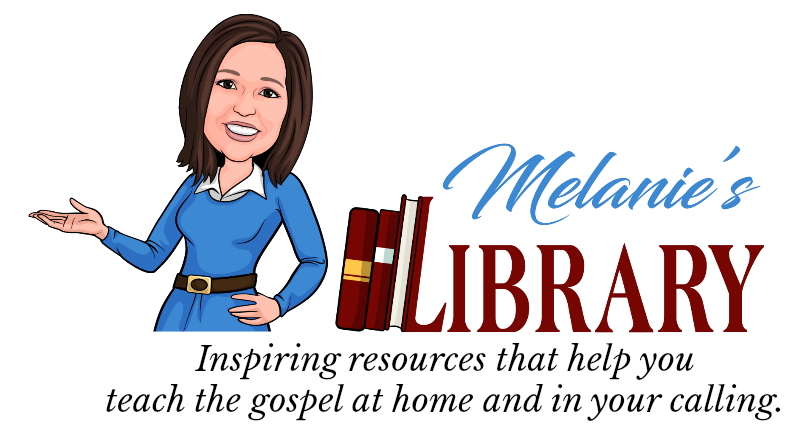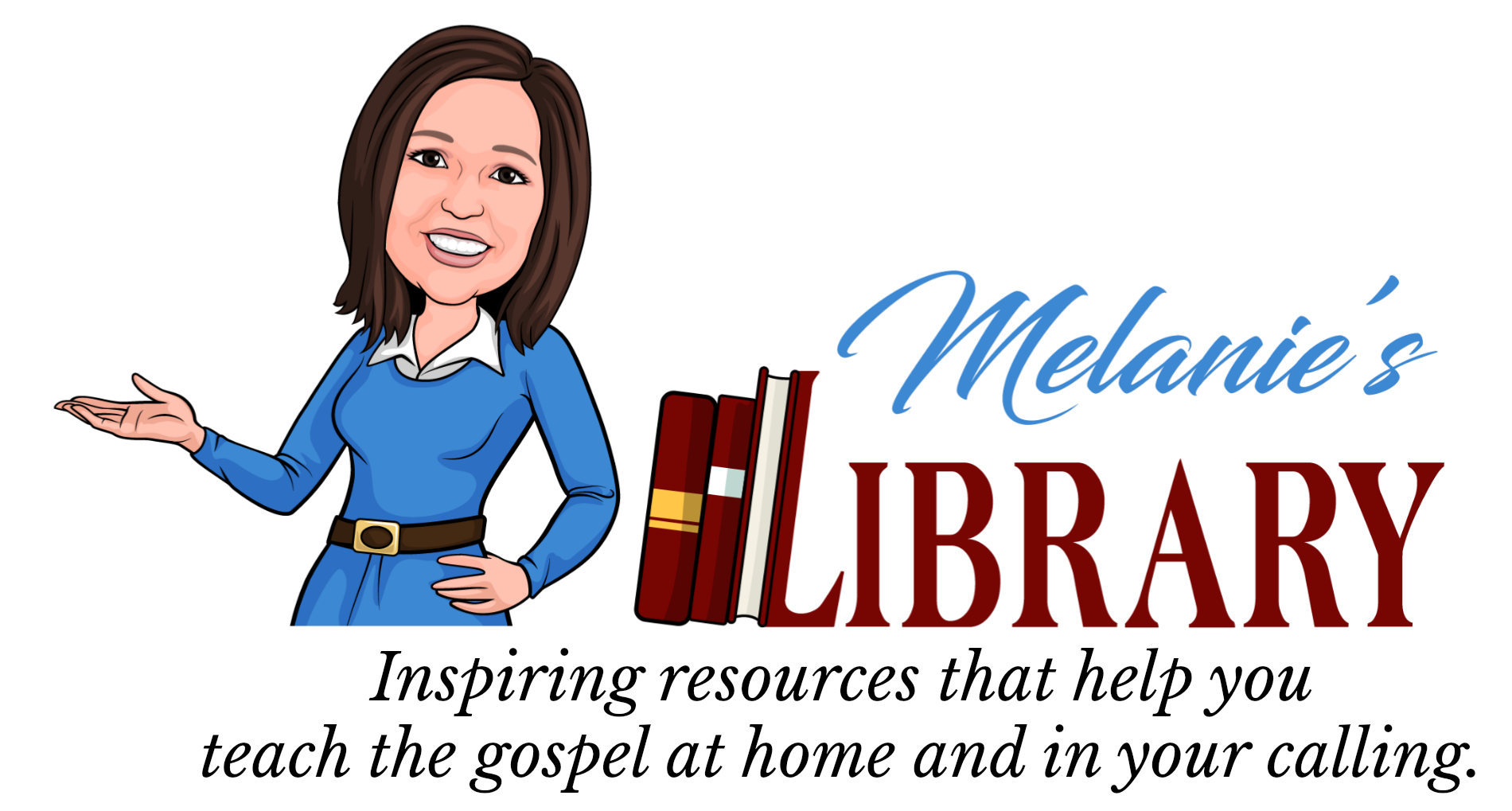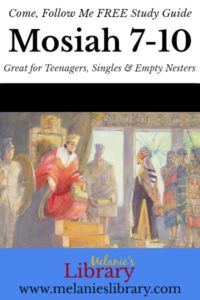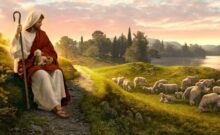Come, Follow Me Daily Study Guide for the week of January 4-10, 2021 covering Joseph Smith – History 1:1-26. For personal and/or family study of the scriptures, geared towards families with teenagers.
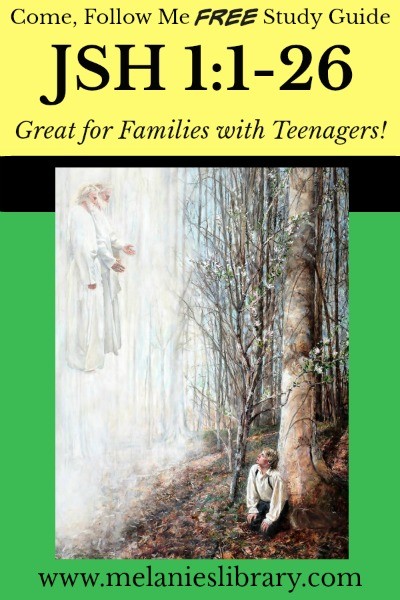
**This is a suggested outline that coincides with the Come, Follow Me manual. There is not just one right way when it comes to studying the scriptures. Everyone should study in a way that is best for them, but I do hope that you find these outlines helpful.
**SCRIPTURE JOURNALS – I highly suggest getting a scripture journal for each person. Many times my outlines will suggest writing something down in your scripture journal. These are also great for writing down any impressions or “Aha” moments that you might have as you study the scriptures. Composition books found at the Dollar Store work great!
**A free PDF DOWNLOAD of the Study Guide is available at the bottom of this post, making it easy for those who’d like to print out a copy. OR you can add Melanie’s Library to your mobile device home screen by following these instructions, click HERE
**SONGS – For a list of suggested songs for each day of the week, be sure and check out the blog called Music for Latter-day Life by clicking HERE
**OPENING SONG SUGGESTION FOR NON-SINGERS – We are not big singers in our family but I know how powerful music can be when it comes to inviting the Spirit. Instead of singing, we have begun listening to the song suggested on Music for Latter-day Life and as we listen we each write in our scripture journals how we have seen the hand of the Lord in our lives or something we are grateful for. It has been a wonderful way to get everyone in the right mindset and to invite the Spirit for our family scripture study.

FHE DAY
Start the week off right with a Family Home Evening that is focused around the upcoming week’s Come, Follow Me. Sign up for the Teach Me FHE email group and receive an FHE outline delivered right to your inbox every Sunday morning. Sign up at the bottom of this post.

IF I ASK IN FAITH, GOD WILL ANSWER
BACKGROUND
OBJECT LESSON: Prayer, click HERE
This object lesson teaches us that we should always turn to the right source for help. Often we look to our friends, family, blogs, or self-help books for the answers that our Father in Heaven is happy to help us solve. Always go to the true source and you will always find the answers you need – maybe not the answer you expected – but the answer you need.
SCRIPTURE
As you know, there was a time that Joseph Smith felt confused about a decision he needed to make.
READ: Joseph Smith – History 1:13
What did Joseph Smith do? If he would have had the internet, do you think he would have checked Google first? 😉
Think of your own need for wisdom and greater understanding, how do you seek truth?
MINI LESSON
SHARE THE FOLLOWING FROM DAVID BUTLER: (Taken from Don’t Miss This)
“I recently visited with a Hindu priest who asked me a simple question: ‘What do you want?’ He then told me something very wise (which you would expect from a Hindu priest, right?), He said, ‘That is an easy question to give an answer to, but a difficult question to give a good answer to.’ He was so very correct. What did I want? At that moment, Taco Bell. But what about life? What do I want? As Joseph Smith did, I reflected on this question again and again – what is it that I actually, really want? Joseph wanted salvation. He was worried about the state of his souls and the fate of mankind. That was what took him to the revival meetings and the church services. That was what took him to the book of James. That was what took him to the grove of trees near his house.
“There seems to be something preparatory about the reflecting and desiring in Joseph’s story. He didn’t close the Bible after reading James 1:5 and walk right into the woods. There was a period of wondering, seeking, thinking, and pondering. Perhaps – just maybe – those were the actions that carved out a place in his mind and heart for the answer that he would receive.”
(The following is adapted from the CFM manual’s introduction for this week.)
As you study the Doctrine and Covenants, you will find that it is a book of answers to prayers: many of the sacred revelations in this book came in response to questions. So it’s appropriate to begin studying the Doctrine and Covenants by considering the question that began the latter-day outpouring of revelation—the one Joseph Smith asked in a grove of trees in 1820.
A “war of words and tumult of opinions” (Joseph Smith—History 1:10) had left Joseph confused about religion and the state of his soul. There are many conflicting ideas and persuasive voices in our day, and when we want to sort through these messages and find truth, we can do what Joseph did. We can ask questions, study the scriptures, ponder, and ultimately ask God. Joseph’s testimony of his miraculous experience boldly declares that anyone “who [lacks] wisdom might ask of God, and obtain” (Joseph Smith—History 1:26).
PONDER & DISCUSS
What do you desire most?
Ponder on how you can better follow Joseph’s example to find an answer to your question. Will it involve reading the scriptures more intently? Or will it involve more wondering, seeking, thinking, and pondering?
ADDITIONAL RESOURCES (optional)
CONFERENCE TALK: Revelation for the Church, Revelation for Our Lives
VIDEO: Receiving Revelation: Power of the Holy Spirit (4:17)
ENSIGN ARTICLE: Personal Revelation

TESTIMONY OF THE FIRST VISION
BACKGROUND
QUOTE BY JOSEPH SMITH:
“I don’t blame anyone for not believing my history. If I had not experienced what I have, I would not have believed it myself” (History of the Church, 6:317).
SCRIPTURE
READ: Joseph Smith – History 1: 15-20
MINI LESSON
VIDEO: Ask of God: Joseph Smith’s First Vision (6:38), click HERE
PONDER & DISCUSS
SHOW IMAGE:
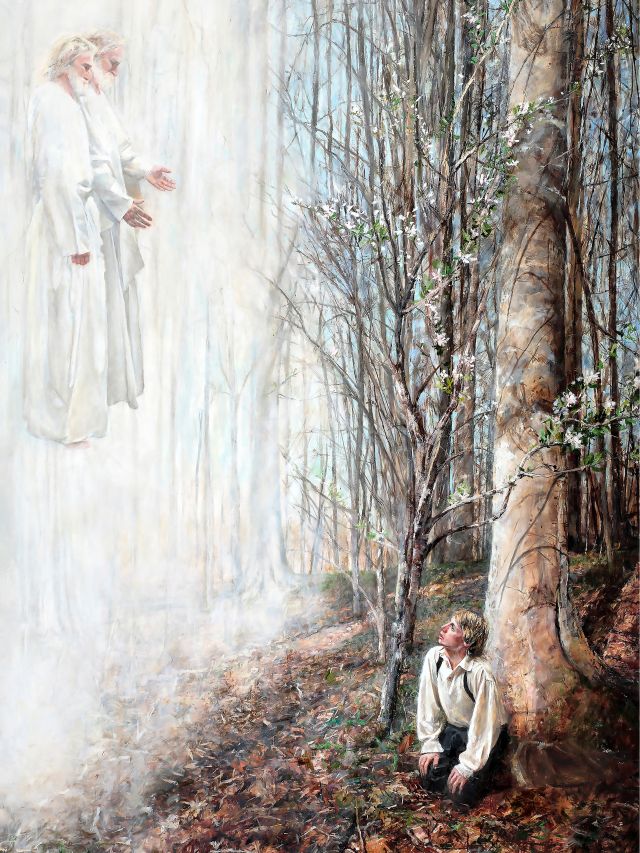
ACTIVITY: (This may work best at the kitchen table.) After looking at the image of the First Vision, give each family member a piece of paper and put markers, colored pencils, crayons, and/or watercolor paints in the middle of the table for everyone to use. Let them know everyone is to draw their own depiction of the First Vision.
As everyone is drawing, discuss the following:
- How has the First Vision changed your life?
- Finish this sentence: “Because the First Vision happened, I know that …”
- How have you been blessed because of the First Vision?
- What are some truths that we learn from this vision?
- When God appeared to Joseph Smith, He called Joseph by name. When have you felt that Heavenly Father knew you personally?
- How did you obtain your testimony of Joseph Smith’s First Vision?
ADDITIONAL RESOURCES (optional)
CONFERENCE TALK: Hear Him
VIDEO: The Message of the Restoration (2:22)
CONFERENCE TALK: The Fruits of the First Vision
CES DEVOTIONAL: Stand in the Sacred Grove

I CAN REMAIN TRUE TO WHAT I KNOW, EVEN IF OTHERS REJECT ME
BACKGROUND
VIDEO: The Piano Guys Behind (4:15), click HERE
ASK:
- According to that video, what were some of the sacrifices that the crew members had to make?
- Because of their sacrifice, did anything great come out of it?
- How often do we make sacrifices for the gospel?
- What are some sacrifices that we might make?
- Has God promised us great blessings if we will make sacrifices for the gospel?
One sacrifice that has been made by many followers of Christ is that of enduring rejection and persecution. One of the blessings of the scriptures is that they contain inspiring examples of valiant men and women who faced such challenges but still remained faithful to the end. One such person is Joseph Smith.
SCRIPTURE
READ: Joseph Smith – History 1: 21-26
ASK: (Questions are taken from Scripture Study for Latter-day Saint Families)
- Why do you think young Joseph openly shared this sacred experience with a Methodist preacher, and why was Joseph “surprised” at the teacher’s reaction?
- Do you think that ministers of the day had taught their congregations to pray and read the scriptures? If so, why would they reject a report of an answer?
- How did Joseph feel about his persecution? (verse 23)
- Did he ever deny what he had seen? (verse 25)
MINI LESSON/PONDER & DISCUSS
(Taken from seminary teacher manual)
SHARE: The following account was told by President Gordon B. Hinckley about a conversation he had with a young man in London, England. As you read the account, ask your family to be pondering what they might do if they were in the same position as this young man.
“He said, ‘I’ve got to talk with someone. I’m all alone. …’
“And I said, ‘What’s your problem?’
“And he said, ‘When I joined the Church a little less than a year ago, my father told me to get out of his home and never come back. And I’ve never been back.’
“He continued, ‘A few months later the cricket club of which I was a member read me off its list, barring me from membership with the boys with whom I had grown up and with whom I had been so close and friendly.’
“Then he said, ‘Last month my boss fired me because I was a member of this church, and I have been unable to get another job. …
“‘And last night the girl with whom I have gone for a year and a half said she would never marry me because I’m a Mormon’” (“The Loneliness of Leadership” [Brigham Young University devotional address, Nov. 4, 1969], 3, speeches.byu.edu).
PAUSE AND ASK:
- Have you ever felt that you have been treated unkindly or criticized because of your religious beliefs? What was the situation?
- Why was Joseph Smith able to look back on his experiences and identify with the Apostle Paul? (Paul had been mocked for his testimony of Jesus Christ and yet remained true to it.)
- How do you think it may have been helpful for Joseph Smith to see things he had in common with the Apostle Paul? (See 2 Corinthians 11:23–27 for a description of Paul’s sufferings.)
- What lesson can we learn from Joseph Smith’s example of studying and pondering the experiences of Paul?
**Have the following statement written on a large piece of paper. Have someone in your family read it. Optional – have family members write this in their scripture journals.**
During difficult times, we can draw strength from the examples of faithful individuals in the scriptures.
- Have you ever been strengthened by studying the experience of a faithful individual in the scriptures? (You may share your own experience or ask a family member to share.)
THE REST OF THE STORY: Read the rest of the account told by President Hinckley about the young man in London, England, who faced great opposition because of his religious beliefs.
“I said, ‘If this has cost you so much, why don’t you leave the Church and go back to your father’s home and to your cricket club and to the job that meant so much to you and to the girl you think you love?’
“He said nothing for what seemed to be a long time. Then, putting his head down in his hands, he sobbed and sobbed. Finally, he looked up through his tears and said, ‘I couldn’t do that. I know this is true, and if it were to cost me my life, I could never give it up’” (“The Loneliness of Leadership,” 3–4).
ADDITIONAL RESOURCES (optional)
CONFERENCE TALK: God Shall Wipe Away All Tears
BYU RELIGIOUS STUDIES CENTER: Suffering for the Savior’s Sake

GENERAL CONFERENCE DAY
Study a recent General Conference talk. A great way to study a conference talk is to read along and highlight the parts that stand out to you. Then after the talk, review and discuss what you have highlighted.
THIS WEEK’S TALK: Watch Ye Therefore, and Pray Always By President M. Russell Ballard, click HERE

CATCH UP DAYS
Do one of the days that you missed OR any of the additional resources listed.
Yours Truly,

P.S. For more Come, Follow Me resources, check out my post Your Ultimate Guide to Come, Follow Me. It lists over 100 Come, Follow Me resources that are available online starting with the church’s resources at the top. You can find it by clicking HERE.
P.P.S. Sign up here for the Teach Me FHE email group and receive FHE outlines delivered right to your inbox every Sunday morning.
Disclaimer: Melanie’s Library is a participant in the Amazon Services LLC Associates Program. An affiliate advertising program designed to provide a means for sites to earn advertising fees by advertising and linking to amazon.com.
